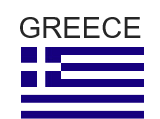
National Interoperability Framework
The National Interoperability Framework (NIF) is a set of standards, policies, and guidelines that ensure that information and communication technology (ICT) systems can communicate and share data seamlessly. It promotes the development of interoperable systems that facilitate data exchange and collaboration between different organizations and levels of government. The NIF provides a common language and a framework for ensuring that ICT solutions are compatible, secure, and reliable, which enhances the efficiency of public services and improves citizen outcomes.
Greek eGovernment Interoperability Framework (Greek e-GIF) Year: 2012 | The interoperability framework is a set of standards and guidelines aimed at ensuring the provision of services for public administration institutions, enterprises and citizens both in the national and the European context. It was ratified by a Ministerial decision and published in the government Gazette YAP / Φ.40.4 / 1/989 ( Government Gazette 1301 / Β '/ 12-04-2012 ). |
Good Practices
This section provides examples at the national level in line with a selection of different thematic areas of the European Interoperability Framework (EIF). Further initiatives and good practices are available in the country’s Digital Public Administration Factsheet.
Since November 2021, the Greek Ministry of Digital Governance has been updating the NIF with active involvement from relevant stakeholders. The design and implementation phase concluded in June 2022, emphasising collaboration with public, private sector, and academia stakeholders. The new framework aligns with European and Greek legislation, the EIF, and considers the European interoperability strategy and the Interoperable Europe Act. The innovation lies in an integrated governance model ensuring sustainability through public and private sector participation. An Implementation Guide and a Digital Portal for the National Interoperability Framework have been developed to support ICT projects and provide up-to-date information. A new Ministerial decision is in progress to officially launch the updated framework's structure and components.
The General Secretariat of Information Systems and Digital Governance published a guide for Digital Accessibility of public sector websites and mobile applications based on the W3C standards and guidelines.
The Hellenic Open Data Portal is the national portal for the dissemination of open data. It is the central directory of the public administration that provides free access to the databases of Greek government agencies. Thirty-nine agencies have been integrated into the portal, providing the data for free through an integrated API. The purpose of the Hellenic Open Data Portal is to increase the web accessibility of Greek public administration datasets by providing integrated services, e.g. cataloguing, indexing, storage, search and availability of public sector data and information, as well as online services to citizens and third-party information systems. The implementation of a new version of the portal is in progress to improve the technical features and functions of the data repository but also to provide a quality upgrade to the information. Special emphasis is placed on the use of APIs both in terms of availability and reception of datasets.

